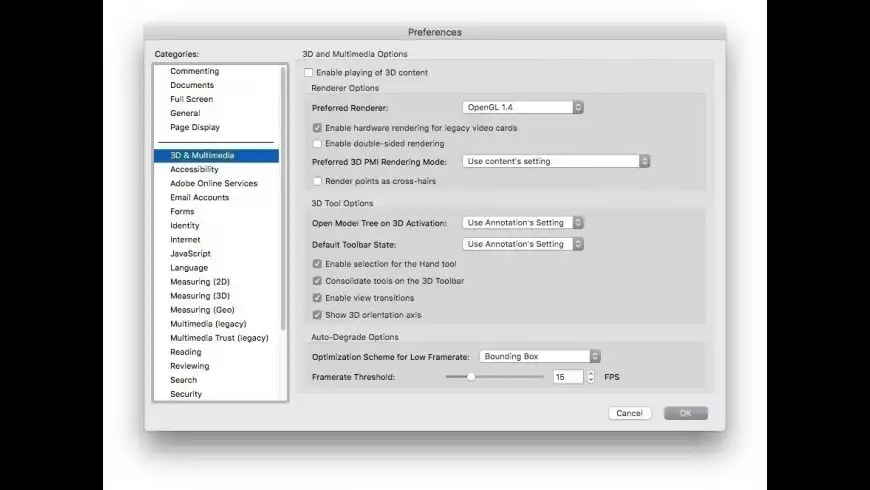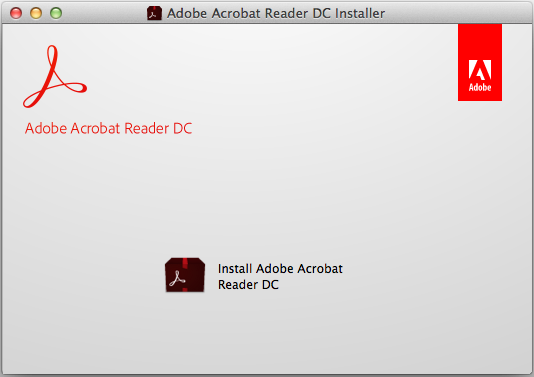Adobe Creative Cloud Photoshop, InDesign, Illustrator, Acrobat Pro and more – graphic design, video, web, and photography tools you need! Available in campus Computer Labs, on University-managed devices, and can be added to personal devices as a licensing add-on. In order to download macOS Catalina 10.15, the user’s Mac must have a minimum of 4 GB of memory as well as 12.5 GB of available storage space. If the user is upgrading their Mac’s OS to Catalina from one which has OS X Yosemite running on it or any of the macOS releases that precede it, they will need a minimum of 18.5 GB of memory.
Note
A new release is available which fixes bug 4324516: Acrobat cannot launch if PDFLib TET Plugin is present. If you’re using v1 - Jan 2021, migrate to the latest version described below.
Downloads¶

To access the downloads:
Go to https://console.adobe.io/downloads.
Download the SDK:
Windows: SDK version v2 - Mar 2021
Macintosh: SDK version v2 - Mar 2021
Installers
The 32-bit Windows and Mac platform uses separate installers for Reader and Acrobat. Windows 64-bit installers combine the two into a single installer.
Adobe Acrobat Reader DC: 32 and 64 bit
Adobe Acrobat Pro DC: 32 and 64 bit
System requirements¶
The SDK supports the following:
Windows: Samples have been upgraded to compile using VS2019 for Windows 7, 8, and 10.
Macintosh: With this release Acrobat SDK samples could be compiled using X-CODE 9.2. Target Mac OS Deployment version is 10.11.
Changes for this release¶
All code samples, tools, and other API dependent assets are updated for compatibility with the latest compilers.
Windows¶

General changes for 64-bit Windows:
You must upgrade 32-bit plugins to 64-bit for them to work with the 64-bit app.
The SDK provides 64-bit public headers to 3rd party plug-in developers so that they can successfully create or upgrade their plugins.
Acrobat and Reader use the same, single installer. The unified application determines the mode in which it’s running (Reader/Acrobat) at run time. Plugins must dynamically check the whether the app is in Acrobat or Reader mode in order to determine what functionality should be available.
The application can transition from Reader mode to Acrobat mode without a relaunch, so plugins must react to mode notifications accordingly.
If any Acrobat-specific HFT is invoked in Reader Mode, it could throw a run-time exception. Plugins need to ensure Acrobat specific HFTs are not invoked while the application is running in Reader mode.
Existing plugins with different binaries for Acrobat and Reader must combine into a single binary. Product differentiation (Reader vs Acrobat) at install time is not possible.
Installation path
64-bit: /Program Files/Adobe/<app name>/Acrobat/plug_ins
32-bit: /Program Files (x86)/Adobe/<app name>/Acrobat/plug_ins
There is no “Acrobat Reader” specific path for 64-bit; there is for 32-bit.
The app name in the path is Acrobat DC.
Samples
App Wizard: The App wizard has been upgraded and will only work with VS2019.
wxPlugin: Upgraded to use wxWidgets 3.1.3. Developers must compile wxwidgets and copy the generated libs to
NonAdobeSupportwxWidgetswinliband header files toNonAdobeSupportwxWidgetswininclude. File paths may vary with a user’s project configuration.Removed unsupported CommonInterfaceAIR.air from snippetRunner Sample.
All existing samples are ported from Microsoft Visual Studio 2013 to Microsoft Visual Studio 2019. Microsoft Visual Studio 2019 is recommended to create and upgrade 64-bit native plugins.
Public header and sample plugins are updated.
Config folder: A new folder contains the common Visual Studio Settings for import by all VS project solutions:
AdobeAcrobatDCSDKVersion1Config.Code changes:
Module | Impacted API | Change |
|---|---|---|
AccessibilitySupport (AcrobatAccess.idl) |
| 32-bit: |
New data type
The following new data scalar type is added to the data types:
Type | Byte size | Description |
|---|---|---|
ASIntPtr_t | 4 ( win-32); 8 (win-64) |
|
ASSize_t | 4 ( win-32); 8 (win-64) | size of objects (as in |
Macintosh¶
Plugin samples
MultiTab: To run the sample, place multitab_icons.pdf (from the SDK package) in
/users/{username}/documentswxPlugin: This plugin is delivered as Windows only due to dependency on the wxwidget library in Macintosh. TBD
AppleScript:
WatermarkJsoAs: you must place the package input files present on the desktop. On script execution, users are prompted to specify an output folder in which to save the stamped file.Tools
verifyUrl.acroplugin: Removed since it uses
HITToolBoxwhich is deprecated by Mac.Sign Plugin.exe: Upgraded to 64 Bit to support Mac OS Catalina.
Known issues¶
Mac only: Acrobat crashes while running media in RunMediaPlayers.pdf
Mac only: Flash player crashes while running media in ScriptEvents.pdf
“SHA1 algorithm warning message” appears when signing using DocSign SDK sample
When protected mode is ON:
PDF file will open in a temporary window while using StaticViewVC.exe/StaticViewVB.exe
WatermarkJsoVB.exe will not work
Other issues:
4301819: PDDomView present in Acrobat SDK sometimes doesn’t work
4316221: Snippet Runner and Weblink Demo are not working on 64-Bit Acrobat due to dependency on the CommonInterfaceAIR.air
4315936: [Protected mode] DMS integration sample is not working
4315935: [Protected mode] Error coming while running ClienApp.exe for the DDE server sample
4324516: Acrobat cannot launch if PDFLib TET Plugin is present. Note: this bug is fixed in the 3/11/2021 update (v2 - Mar 2021).
Applies to: Azure Information Protection
Relevant for: AIP unified labeling client and classic client
Note
To provide a unified and streamlined customer experience, Azure Information Protection classic client and Label Management in the Azure Portal are being deprecated as of March 31, 2021. This time-frame allows all current Azure Information Protection customers to transition to our unified labeling solution using the Microsoft Information Protection Unified Labeling platform. Learn more in the official deprecation notice.
This article describes the protected PDF readers that are supported for Azure Information Protection (AIP). Protected PDF readers enable users to open those encrypted PDFs and view the sensitive information contained.
Encrypting your PDFs with AIP ensures that unauthorized people cannot read the file's content. Protected PDF readers that support AIP verify that you've been granted permissions to open the document, and also decrypt the content for you.
For example, the following image shows an encrypted document open in Adobe Acrobat Reader. The bar at the top indicates that the document is protected by a Microsoft Information Protection solution.
For instructions, see the following sections:
Tip
If your document doesn't open after installing a recommended reader, the document may be protected in an older format.
In this case, try one of the readers listed as supported for previous formats. For more information, see Support for previous formats.
ISO standards for PDF encryption
The PDF readers referenced on this page can all open protected documents that adhere to the ISO standard for PDF encryption.
This standard is used by default by the AIP client.
Note
Classic client only: If you have the AIP classic client, this may have been disabled by an administrator.
Viewing protected PDFs in Adobe Acrobat Reader

Adobe Acrobat Reader integrates with Microsoft Information Protection solutions, such as Azure Information Protection to provide users with a simplified and consistent experience for classified and/or protected PDFs.
The Adobe Acrobat Reader with Microsoft Information Protection integration is supported for Windows and macOS.
For more information, see the following blog posts:
Viewing protected PDFs in Microsoft Edge on Windows or Mac
Microsoft Edge offers built-in support for viewing PDF files that are classified and protected. Use of Microsoft Edge ensures that users can open protected PDF files seamlessly without the need to install or configure any extra settings or software.
Supported versions include:
Windows: Windows 10 and previous versions through Windows 8.
For more information about earlier versions, see Support for previous formats.
Mac: macOS versions 10.12 and above
Instructions:
Check which Microsoft Edge version is installed on your system.
If the Microsoft Edge version is 83.0.478.37 or above, you can open protected files directly in the Edge browser.
To open PDF files in SharePoint, click Open > Open in browser.
Installing a protected PDF reader for Windows or Mac
To open a protected PDF document on your desktop computer, we recommend that you install the relevant Microsoft Information Protection (MIP) plug-in for Acrobat and Acrobat Reader for your operating system.
Instructions:
If you haven't already, install the Adobe Reader from the Adobe site.
Make sure that you read and agree to the Adobe General Terms of Use.
Install the MIP plug-in for Acrobat and Acrobat Reader for your operating system.
Supported versions include:
Windows: Windows 10 and previous versions through Windows 8.
For more information about earlier versions, see Support for previous formats.
Mac: macOS versions 10.12 - 10.14
If prompted for admin approval, ask your admin to authorize the plug-in.
For example:
Note

For more information, see the Microsoft Information Protection and Adobe release announcement.
Alternative protected PDF readers for Windows

Alternatively, use one of the following PDF readers for Windows that adhere to the ISO standard for PDF encryption:
Installing a protected PDF reader for mobile (iOS/Android)
To open a protected PDF on your iOS or Android device, download and install the app for your operating system:
| OS | Link |
|---|---|
| iTunes | |
| Google Play |
For more information, see Mobile viewer apps for Azure Information Protection (iOS and Android).
Support for previous formats
The following PDF readers support both protected PDFs with a .ppdf extension, and older formats with a .pdf extension.
If you're unable to open your protected PDF using the recommended reader, the document may be protected in a previous format. For example, Microsoft SharePoint currently uses an older format for PDF documents in IRM-protected libraries.
Windows 10 / previous versions through Windows 7 Service Pack 1
- Gaaiho Doc
- GigaTrust Desktop PDF Client for Adobe
- Foxit Reader
- Nitro PDF Reader
- Nuance Power PDF
- Edge Chromium
Android:
- Foxit MobilePDF with RMS
- GigaTrust App for Android
iOS:
- Foxit MobilePDF with RMS
- TITUS Docs
macOS Catalina: Edge Chromium
Next steps
Download Adobe Acrobat Reader For Mac Catalina Patcher
If you need more help after installing, use the instructions and documentation for each reader. For example, see the following articles:
